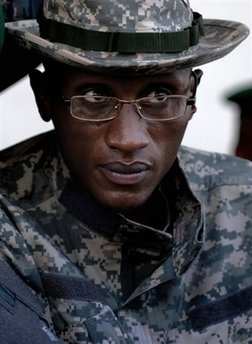 KINSHASA (AFP) – Congolese rebel leader Laurent Nkunda was under arrest Friday in neighbouring Rwanda awaiting extradition on war crimes charges after his erstwhile Tutsi allies turned against him.
KINSHASA (AFP) – Congolese rebel leader Laurent Nkunda was under arrest Friday in neighbouring Rwanda awaiting extradition on war crimes charges after his erstwhile Tutsi allies turned against him.
In a startling reversal of fortune, Nkunda was captured late Thursday after he fled to Rwanda to escape a joint operation by ethnic Tutsi Rwandan troops and Congolese army forces, officials from both countries said.
UN peacekeeping force MONUC urged Nkunda's remaining rebels to give themselves up, saying his arrest "offers new opportunities to take part in the process of reintegration" into the formal armed forces.
Top commanders who broke with Nkunda last month have already surrendered, and his rebellion appears to have collapsed completely amid the whirlwind of events of the past few days.
Rwanda was expected to hand over the captured Congolese rebel leader to local authorities in the eastern Congolese city of Goma on Friday, diplomatic and military sources said.
"For me, it's a done deal. He'll be taken straight away to Kinshasa," a diplomatic source told AFP in the capital Kinshasa.
Communications Minister Lambert Mende said the government wanted Rwanda to hand Nkunda over to face war crimes charges, saying he had "caused a lot of bloodshed in our eastern provinces, especially in Nord- and Sud-Kivu".
Nkunda is accused of war crimes committed in the town of Bukavu, capital of Sud-Kivu, which his forces briefly captured in June 2004.
"He systematically undermined all efforts to bring non-violent peace and tried to ridicule the president (Joseph Kabila) and all our institutions," said Mende.
The developments prompted UN-led mediators to postpone talks between the main protagonists in the DR Congo crisis, which had been due to resume on Monday.
The United States hailed his arrest as "a welcome step on the road to peace".
"He has caused nothing but havoc for the people of Congo and, frankly, for the people of the region. He has been causing havoc for far too long," said State Department spokesman Robert Wood.
Nkunda was arrested during a surprise joint operation by Rwandan and Congolese government troops mounted Tuesday, ostensibly to flush out Rwandan Hutu FDLR rebels. The joint force has yet to move in on the rebels, the Democratic Force for the Liberation of Rwanda (FDLR), who took refuge in eastern Congo after participating in Rwanda's 1994 genocide.
A Rwandan official, however, said a group of FDLR rebels were on Friday in the Rwandan capital for talks on surrendering. The official said 160 surrendered on Thursday and delegated 15 of their number to travel to Kigali on an "exploratory mission".
The claim was denied by FDLR chairman Ignace Murwanashyaka, speaking from Germany, who called the so-called surrender "trademark Kigali propaganda". The FDLR have thrived in a poisoned diplomatic environment where rebel groups in eastern Congo have effectively been the proxies of Rwanda and DR Congo.
Rwanda had consistently denied abetting Nkunda's rebellion and in turn accused Kinshasa of actively sheltering and backing the FDLR, which includes some of the main perpetrators of the 1994 Hutu genocide against the Tutsis. Both Kinshasa and Kigali want to finish off the FDLR, which took refuge in Congo after participating in the genocide, which saw the slaughter of 800,000 Tutsis and moderate Hutus.
Rwandan forces are deeply unpopular in the region where atrocities committed during the 1988-2002 war caused lasting resentment in the local population. Nkunda, who walked away from a post of general in the Congolese army to lead the National Congress for the Defence of the People (CNDP), has been the subject of a Congolese arrest warrant since 2005.
A January 2008 peace accord between the Kinshasa government and Nkunda's CNDP broke down on August 28, sparking a new humanitarian crisis as more than 115,000 people were forced to flee fighting. By late 2008, after a series of victories, Nkunda had forced Kabila to the negotiating table and received former presidents as United Nations envoys at his base in the east of the country. But his position was fatally weakened after he lost the support of top commanders who switched allegiance to the government earlier this month.



